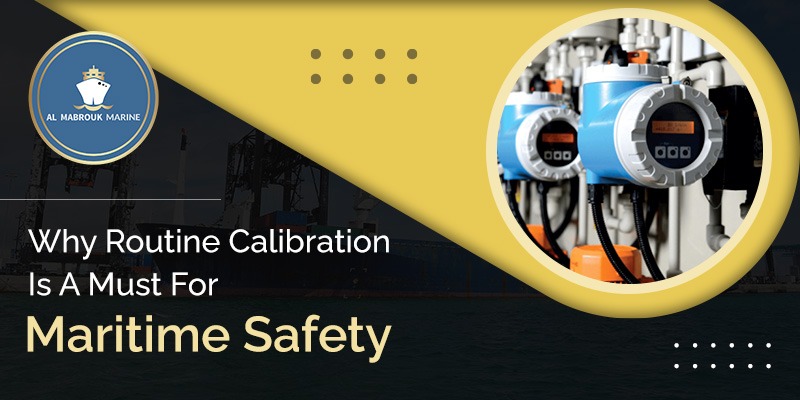The safety of maritime operations relies heavily on the precision and reliability of onboard equipment. This is where routine calibration services in the UAE play a crucial role in ensuring that every instrument on board operates with the utmost accuracy and adherence to regulations. Let’s explore why these routine calibrations are more than just technicalities, and why they matter for maritime safety.
Al Mabrouk Marine, offering comprehensive marine services in UAE, understand the criticality of accurate equipment calibration for Dubai ship owners and the broader maritime industry. Their expertise ensures that vessels maintain optimal performance and compliance with safety standards, ultimately enhancing the safety of maritime operations in UAE.
The Importance of Routine Calibration
Routine calibration is essential for maritime safety for several reasons. For example, regular calibration is essential for gas detectors to maintain reliable performance and ensure optimal safety. Therefore, routine calibration is necessary for maritime safety to prevent accidents, ensure compliance with regulations, and maintain the reliability of essential equipment. Here are reasons why equipment calibration services are vital:
- Accurate Compliance: Calibration is not just a checkbox; it’s a necessity to meet the stringent regulations governing maritime safety. Regular calibration ensures that equipment operates within specified parameters, keeping vessels in compliance with the law.
- Preventing Maritime Mishaps: Picture this – a slight miscalibration in navigation instruments or a gas detection system could lead to disastrous consequences. Routine calibration acts as a safety net, eliminating the risks associated with uncalibrated equipment and averting potential accidents.
- Prolonged Equipment Life: Just as a ship needs regular maintenance to sail smoothly, maritime equipment requires routine calibration to extend its working life. This not only safeguards the crew but also contributes to the overall efficiency of the vessel.
What Are The Consequences Of Not Calibrating Maritime Equipment?
Not calibrating maritime equipment can have serious consequences. Uncalibrated equipment can be a source of risks, and minor inaccuracies can lead to dangerous consequences, putting the crew in danger. Faulty equipment can cause accidents, injuries, and even fatalities, leading to reputational damage and loss of trustworthiness. Inaccurate measurements can also lead to poor-quality products, which can harm consumer health. Additionally, uncalibrated equipment can result in increased downtime, wastage of resources, and potential safety hazards. Therefore, it is crucial to calibrate maritime equipment regularly to ensure accurate measurements, maintain safety, and prevent accidents.
Contact Al Mabrouk Marine for high-quality marine calibration services in UAE.
What Are The Benefits Of Calibrating Maritime Equipment?
Calibrating maritime equipment has several benefits. First, it improves safety by eliminating the risks associated with uncalibrated equipment, as minor inaccuracies can lead to dangerous consequences. Second, it ensures accurate measurements, which are the foundation of quality, safety, and innovations of most products. Third, calibration helps maintain consistency and prolong the working life of the equipment. Fourth, it helps increase profitability, safety, and innovation, as well as improve compliance with environmental and other regulations. Fifth, calibration is crucial for gas detection systems to monitor potentially hazardous gases, ensuring they can detect even trace amounts of harmful substances. Therefore, calibrating maritime equipment is essential to ensure safety, accuracy, reliability, and compliance with regulations.
How Does Calibration Improve Safety In The Maritime Industry?
Calibration improves safety in the maritime industry by ensuring that equipment operates accurately within specified parameters, conforming to relevant legislation and regulations. Specifically, in the case of gas detection systems, regular calibration using calibration gases helps verify the accuracy and reliability of the systems, ensuring they can detect even trace amounts of harmful substances, thus providing early warnings and preventing potential disasters.
Additionally, calibration helps eliminate the risks associated with uncalibrated equipment, as minor inaccuracies can lead to dangerous consequences, thereby safeguarding the lives of crew members, the ship itself, and the marine environment. Therefore, by maintaining the accuracy and reliability of essential instruments, calibration plays a vital role in mitigating potential hazards, ensuring regulatory compliance, and ultimately safeguarding lives and the environment in the maritime industry.
Al Mabrouk offers Calibration services in UAE and provides the necessary checks and balances, ensuring that vessels sail not just smoothly but also safely through unpredictable waters with the precision offered by our professional calibration services.

